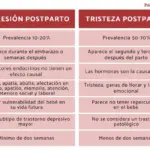
There are some women who, after giving birth, enter a state of inexplicable sadness.. Irritability, emotional decline, sudden mood changes, fatigue and, in some cases, spontaneous crying appear.
This phenomenon does not always have to be a case of postpartum depression; It could also be something known as baby blues and that, in fact, is very common.
What is baby blues?
Baby blues is a psychological phenomenon that involves entry into a state of sadness which can last between a few hours, a few days and two weeks following delivery. It is considered to be especially common in first-time mothersand its symptoms are not so intense as to significantly interfere with the chores of the person who has given birth.
This means that although baby blues is annoying and generates discomfort (or, rather, it is the discomfort itself) it does not make women unable to carry out their daily tasks and does not reduce their autonomy.
Baby blues is, more than anything, a phenomenon that affects the subjectivity of the person, and that beyond the discomfort itself does not have very clear and evident objective manifestations. From a clinical point of view, it is not very important.
In short, baby blues is not a psychological disorder, but rather a set of mild symptoms that, when added together, do not compromise the mother’s mental health.
How does it manifest?
Among the most frequent symptoms of baby blues are these:
The causes of baby blues
What causes the appearance of baby blues? It is not easy to know, but specialists attribute it to the sudden hormonal changes that occur in the mother after birth. Specifically, The hormones and substances that intervene in these changes are estrogens.serotoninprogesterone and prolactin.
However, not all causes are isolated within the mother’s biology: the way it is affected by the environment also produces important effects. Specifically, the need to care for the baby during the first two weeks produces significant physical and psychological exhaustion that often translates into lack of sleep.
In turn, the effects that the environment produces on the body mix with the hormonal changes generated by childbirth, and from that neurochemical whirlwind the baby blues is born.
The mild version of postpartum depression
It is very common to confuse baby blues with postpartum depression, since both phenomena are related to sadness. However, The differences between both phenomena are notable.. In fact, baby blues is sometimes called postpartum blues to differentiate it from this other one.
The baby blues is a set of symptoms, while Postpartum depression is a threat to mental health and is the reason for clinical psychological and psychiatric treatment that sometimes requires the use of psychotropic drugs. Furthermore, the first disappears on its own, but the second must be treated by health specialists.
Furthermore, while baby blues can last a maximum of two weeks and can only appear during the following days after birth, postpartum depression can last a year and appear at a later stage, weeks after the moment of giving birth.
On the other hand, baby blues is much more common, since It can appear in up to 80% of cases of childbirthwhile postpartum depression in any of its degrees of intensity does not exceed 15%.
How to deal with baby blues
To know how to manage baby blues, it is advisable to follow these simple guidelines:
1. Understand that it is something hormonal
It is useless to try to rationalize your emotions and your discomfort, blaming others. It is preferable to keep in mind that this discomfort is due to a very common hormonal imbalance, and that it will pass on its own.
2. Find moments to rest
If you can have the opportunity to rest and sleep wellmuch of the discomfort will go away soon.
3. Follow routines
Do not expose yourself to very chaotic and unpredictable behavior dynamics: follow well-defined habits to help your hormone levels return to balance.
4. Accept help from others
Having a birth is not easyand the others know it. The baby blues is but one of the many proofs of that. For this reason, it is a good idea to accept help from those who are in a position to help with tasks.








